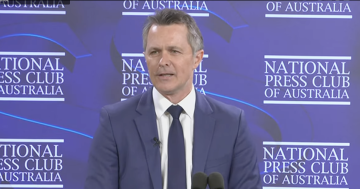
Education Minister Jason Clare says the government is open to changing the way HECS/HELP indexation is applied. Photo: Facebook.
Current and former students with Higher Education Contribution Scheme (HECS) and Higher Education Loan Program (HELP) debtors have seen their debts rise by 7.1 per cent or an average of more than $1000 following the indexation of their loans from 1 June.
The big jump is the highest in three decades and reflects the current high levels of inflation. It follows a relatively benign period where those debts have only increased at about two per cent per year over the past decade.
While HECS and HELP loans as well as vocational education loans are technically interest free, the principal is indexed to keep pace with inflation so the Federal Government or lending organisation gets the true value of the loan paid back over the loan period.
And for people applying for finance or credits cards, rising HECS/HELP debts are considered by lending institutions doing debt-to-income calculations as if they were any other kind of debt, thus putting already skyrocketing housing prices further out of reach for some.
The average time it takes for a former student to pay their HECS debt is reportedly about a decade. The average debt is about $25,000, although more than half the respondents to a recent survey were still repaying their bill in their 40s. Almost 60 per cent of HECS debt holders are female.
The latest move is in contrast with that of the US. In October last year US President Joe Biden fulfilled an election promise by erasing $US10,000 (A$14,500) in federal student loan debt for those on incomes less than $US125,000 (A$181,000) a year, or for households that earn less than $US250,000 (A$362,000).
On 1 June, Education Minister Jason Clare said that while there were no thoughts of forgiving or erasing HECS debts on the table, the government was open to looking at how HECS/HELP was repaid, and how the indexation was applied.
While the indexation was currently applied to the original debt rather than the current balance, Mr Clare said this should be reconsidered and has ordered it be part of a wider review into higher education.
“If you’ve got a debt of $20,000, you pay off about $2000 over the course of the next 11 months, then the ATO index is based on the original $20,000 not the $18,000 – that strikes me as not right,” he said.
His comments come ahead of an interim Accord Team report expected to be published with some recommendations in July, and a final report later this year.
A Senate committee rejected a private member’s bill to halt indexation on student loans in April. The bill, proposed by the Greens, would have frozen the $74 billion in debt, and seen the minimum wage repayment threshold instead aligned with the median wage. But it was voted down by Labor and Coalition members.
Some of the commentary surrounding the indexation rise has led to confusion among HECS/HELP loan holders.
“The taxpayer lends you money, lends you a dollar, and they get that dollar back at its real value,” Mr Clare said. “It’s indexed to inflation. So, the taxpayer doesn’t make a profit at all. If there’s a change to the way this works, the indexation, then effectively the taxpayer has to pay more.
“If you do what the Greens are talking about doing in getting rid of indexation altogether, it would cost the taxpayer $9 billion. What I said in Parliament… I don’t want people thinking university is not worth it. University is worth it big time.
“Getting a uni degree costs money, but it’s valuable. Most people here [Parliament House] have got a university degree. Going to university costs you money to get a degree, but it’s got real value too.
“Almost every single job requires you to finish school and go on to TAFE or go on to university. We need to encourage more people to do that.”



















